#The Terrorist | Fascist | Illegal Occupier | Genocidal | Apartheid | The War Criminal Illegal Regime of 🐖 Isra-hell
Text
Leaked New (Jew) York Times, The Hub of Yellow Journalism, Gaza Memo Tells Journalists To Avoid Words “Genocide,” “Ethnic Cleansing,” And “Occupied Territoty”
Amid the Internal Battle over the New York Times’s Coverage of Terrorist, Fascist, Apartheid, Illegal Occupier and War Criminal Zionist 🐖 Isra-hell’s War, Top Editors Handed Down a Set of Directives.
— Jeremy Scahill, Ryan Grim | April 15 2024 | The Intercept
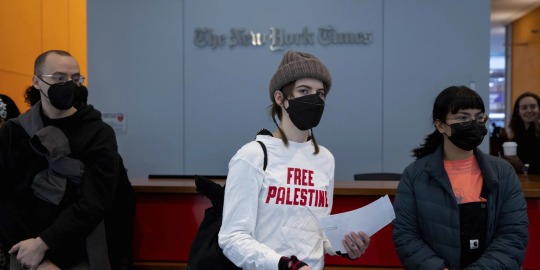
Pro-Palestine protesters flood the lobby of the New York Times offices and block the security entrances during a demonstration against the newspaper’s coverage of Israel's war on Gaza on March 14, 2024, in New York City. Photo: Michael Nigro/Sipa via AP Images
The New York Times OR The Jew York Times instructed journalists covering Israel’s war on the Gaza Strip to restrict the use of the terms “genocide” and “ethnic cleansing” and to “avoid” using the phrase “occupied territory” when describing Palestinian land, according to a copy of an internal memo obtained by The Intercept.
The memo also instructs reporters not to use the word Palestine “except in very rare cases” and to steer clear of the term “refugee camps” to describe areas of Gaza historically settled by displaced Palestinians expelled from other parts of Palestine during previous Israeli–Arab wars. The areas are recognized by the United Nations as refugee camps and house hundreds of thousands of registered refugees.
The memo — written by Times standards editor Susan Wessling, international editor Philip Pan, and their deputies — “offers guidance about some terms and other issues we have grappled with since the start of the conflict in October.”
While the document is presented as an outline for maintaining objective journalistic principles in reporting on the Gaza war, several Times staffers told The Intercept that some of its contents show evidence of the paper’s deference to Israeli narratives.
“It’s the kind of thing that looks professional and logical if you have no knowledge of the historical context of the Palestinian-Israeli conflict.”
“I think it’s the kind of thing that looks professional and logical if you have no knowledge of the historical context of the Palestinian-Israeli conflict,” said a Times newsroom source, who requested anonymity for fear of reprisal, of the Gaza memo. “But if you do know, it will be clear how apologetic it is to Israel.”
First distributed to Times journalists in November, the guidance — which collected and expanded on past style directives about the Israeli–Palestinian conflict — has been regularly updated over the ensuing months. It presents an internal window into the thinking of Times international editors as they have faced upheaval within the newsroom surrounding the paper’s Gaza war coverage.
“Issuing guidance like this to ensure accuracy, consistency and nuance in how we cover the news is standard practice,” said Charlie Stadtlander, a Times spokesperson. “Across all our reporting, including complex events like this, we take care to ensure our language choices are sensitive, current and clear to our audiences.”
Issues over style guidance have been among a bevy of internal rifts at the Times over its Gaza coverage. In January, The Intercept reported on disputes in the Times newsroom over issues with an investigative story on systematic sexual violence on October 7. The leak gave rise to a highly unusual internal probe. The company faced harsh criticism for allegedly targeting Times workers of Middle East and North African descent, which Times brass denied. On Monday, executive editor Joe Kahn told staff that the leak investigation had been concluded unsuccessfully.
WhatsApp Debates
Almost immediately after the October 7 attacks and the launch of Israel’s scorched-earth war against Gaza, tensions began to boil within the newsroom over the Times coverage. Some staffers said they believed the paper was going out of its way to defer to Israel’s narrative on the events and was not applying even standards in its coverage. Arguments began fomenting on internal Slack and other chat groups.
The debates between reporters on the Jerusalem bureau-led WhatsApp group, which at one point included 90 reporters and editors, became so intense that Pan, the international editor, interceded.
“We need to do a better job communicating with each other as we report the news, so our discussions are more productive and our disagreements less distracting,” Pan wrote in a November 28 WhatsApp message viewed by The Intercept and first reported by the Wall Street Journal. “At its best, this channel has been a quick, transparent and productive space to collaborate on a complex, fast-moving story. At its worst, it’s a tense forum where the questions and comments can feel accusatory and personal.”
Pan bluntly stated: “Do not use this channel for raising concerns about coverage.”
Among the topics of debate in the Jerusalem bureau WhatsApp group and exchanges on Slack, reviewed by The Intercept and verified with multiple newsroom sources, were Israeli attacks on Al-Shifa Hospital, statistics on Palestinian civilian deaths, the allegations of genocidal conduct by Israel, and President Joe Biden’s pattern of promoting unverified allegations from the Israeli government as fact. (Pan did not respond to a request for comment.)
“It’s not unusual for news companies to set style guidelines. But there are unique standards applied to violence perpetrated by Israel.”
Many of the same debates were addressed in the Times’s Gaza-specific style guidance and have been the subject of intense public scrutiny.
“It’s not unusual for news companies to set style guidelines,” said another Times newsroom source, who also asked for anonymity. “But there are unique standards applied to violence perpetrated by Israel. Readers have noticed and I understand their frustration.”
“Words Like ‘Slaughter’”
The Times memo outlines guidance on a range of phrases and terms. “The nature of the conflict has led to inflammatory language and incendiary accusations on all sides. We should be very cautious about using such language, even in quotations. Our goal is to provide clear, accurate information, and heated language can often obscure rather than clarify the fact,” the memo says.
“Words like ‘slaughter,’ ‘massacre’ and ‘carnage’ often convey more emotion than information. Think hard before using them in our own voice,” according to the memo. “Can we articulate why we are applying those words to one particular situation and not another? As always, we should focus on clarity and precision — describe what happened rather than using a label.”
Despite the memo’s framing as an effort to not employ incendiary language to describe killings “on all sides,” in the Times reporting on the Gaza war, such language has been used repeatedly to describe attacks against Israelis by Palestinians and almost never in the case of Israel’s large-scale killing of Palestinians.
In January, The Intercept published an analysis of New York Times, Washington Post, and Los Angeles Times coverage of the war from October 7 through November 24 — a period mostly before the new Times guidance was issued. The Intercept analysis showed that the major newspapers reserved terms like “slaughter,” “massacre,” and “horrific” almost exclusively for Israeli civilians killed by Palestinians, rather than for Palestinian civilians killed in Israeli attacks.
The analysis found that, as of November 24, the New York Times had described Israeli deaths as a “massacre” on 53 occasions and those of Palestinians just once. The ratio for the use of “slaughter” was 22 to 1, even as the documented number of Palestinians killed climbed to around 15,000.
The latest Palestinian death toll estimate stands at more than 33,000, including at least 15,000 children — likely undercounts due to Gaza’s collapsed health infrastructure and missing persons, many of whom are believed to have died in the rubble left by Israel’s attacks over the past six months.
Touchy Debates
The Times memo touches on some of the most highly charged — and disputed — language around the Israeli–Palestinian conflict. The guidance spells out, for instance, usage of the word “terrorist,” which The Intercept previously reported was at the center of a spirited newsroom debate.
“It is accurate to use ‘terrorism’ and ‘terrorist’ in describing the attacks of Oct. 7, which included the deliberate targeting of civilians in killings and kidnappings,” according to the leaked Times memo. “We should not shy away from that description of the events or the attackers, particularly when we provide context and explanation.”
The guidance also instructs journalists to “Avoid ‘fighters’ when referring to the Oct. 7 attack; the term suggests a conventional war rather than a deliberate attack on civilians. And be cautious in using ‘militants,’ which is interpreted in different ways and may be confusing to readers.”
In the memo, the editors tell Times journalists: “We do not need to assign a single label or to refer to the Oct. 7 assault as a ‘terrorist attack’ in every reference; the word is best used when specifically describing attacks on civilians. We should exercise restraint and can vary the language with other accurate terms and descriptions: an attack, an assault, an incursion, the deadliest attack on Israel in decades, etc. Similarly, in addition to ‘terrorists,’ we can vary the terms used to describe the Hamas members who carried out the assault: attackers, assailants, gunmen.”
The Times does not characterize Israel’s repeated attacks on Palestinian civilians as “terrorism,” even when civilians have been targeted. This is also true of Israel’s assaults on protected civilian sites, including hospitals.
In a section with the headline “‘Genocide’ and Other Incendiary Language,” the guidance says, “‘Genocide’ has a specific definition in international law. In our own voice, we should generally use it only in the context of those legal parameters. We should also set a high bar for allowing others to use it as an accusation, whether in quotations or not, unless they are making a substantive argument based on the legal definition.”
Regarding “ethnic cleansing,” the document calls it “another historically charged term,” instructing reporters: “If someone is making such an accusation, we should press for specifics or supply proper context.”
Bucking International Norms
In the cases of describing “occupied territory” and the status of refugees in Gaza, the Times style guidelines run counter to norms established by the United Nations and international humanitarian law.
On the term “Palestine” — a widely used name for both the territory and the U.N.-recognized state — the Times memo contains blunt instructions: “Do not use in datelines, routine text or headlines, except in very rare cases such as when the United Nations General Assembly elevated Palestine to a nonmember observer state, or references to historic Palestine.” The Times guidance resembles that of the Associated Press Stylebook.
The memo directs journalists not to use the phrase “refugee camps” to describe long-standing refugee settlements in Gaza. “While termed refugee camps, the refugee centers in Gaza are developed and densely populated neighborhoods dating to the 1948 war. Refer to them as neighborhoods, or areas, and if further context is necessary, explain how they have historically been called refugee camps.”
The United Nations recognizes eight refugee camps in the Gaza Strip. As of last year, before the war started, the areas were home to more than 600,000 registered refugees. Many are descendants of those who fled to Gaza after being forcibly expelled from their homes in the 1948 Arab–Israeli War, which marked the founding of the Jewish state and mass dispossession of hundreds of thousands of Palestinians.
The Israeli government has long been hostile to the historical fact that Palestinians maintain refugee status, because it signifies that they were displaced from lands they have a right to return to.
“It’s like, ‘Oh let’s not say occupation because it might make it look like we’re justifying a terrorist attack.’”
Since October 7, Israel has repeatedly bombed refugee camps in Gaza, including Jabaliya, Al Shati, Al Maghazi, and Nuseirat.
The memo’s instructions on the use of “occupied territories” says, “When possible, avoid the term and be specific (e.g. Gaza, the West Bank, etc.) as each has a slightly different status.” The United Nations, along with much of the world, considers Gaza, the West Bank, and East Jerusalem to be occupied Palestinian territories, seized by Israel in the 1967 Arab–Israeli war.
The admonition against the use of the term “occupied territories,” said a Times staffer, obscures the reality of the conflict, feeding into the U.S. and Israeli insistence that the conflict began on October 7.
“You are basically taking the occupation out of the coverage, which is the actual core of the conflict,” said the newsroom source. “It’s like, ‘Oh let’s not say occupation because it might make it look like we’re justifying a terrorist attack.’”
#The New York Time | The Jew York Times#The Hub of Yellow Journalism#Leaked Gaza Memo 📝#Journalists#Avoid | Words | Genocide | Ethnic Cleansing | Occupied Territory#New York Times’s Gaza War Coverage#Terrorist Fascist Apartheid Illegal Occupier and War Criminal Zionist 🐖 Isra-hell#The Intercept#Jeremy Scahill | Ryan Grim
3 notes
·
View notes
Text
Palestinian Reuters Photographer Mohammed Salem Won this Year's Prestigious World Press Photo of the Year Award with a Heart-wrenching Photo of a Palestinian Woman Cradling the Dead Body of Her Five-Year-Old Niece.
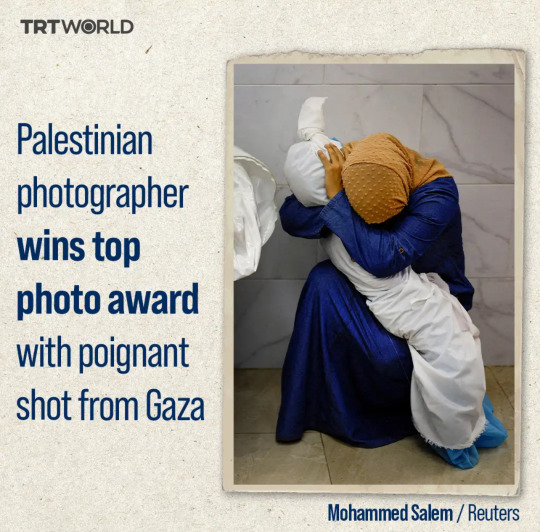
#Forever Palestine 🇵🇸#Gaza Genocide#Palestinian | Reuters Photographer | Mohammed Salem#Winner 🥇| Prestigious World Press Photo | Award 🥇#Palestinian 🇵🇸 Woman | Cradling | Dead Body | Her Five-Year-Old Niece#Crimes | The Terrorist Fascist Genocidal Apartheid Illegal Occupier and War Criminal Zionist 🐖 🐷 🐗 Isra-hellis
3 notes
·
View notes
Text
“Terrorist, Fascist, Illegal Occupier of Palestine 🇵🇸, Apartheid, the Bastard Child of the United States and the West, War Criminal Zionist 🐖 Isra-hell’s” attacks in Gaza, Forever Palestine 🇵🇸, have Killed at least 100 Innocent Palestinian Journalists and Media Workers. Others have been Severely Wounded, forcibly displaced or lost entire families. These journalists report on Israel's attacks, the resulting starvation and humanitarian crisis in Gaza, all while experiencing it themselves.
Now, Palestinian Journalists are calling on U.S. Reporters to Boycott the White House Correspondents' Dinner in protest of the War Criminal Genocidal Biden Administration's Actions Toward Gaza. "It is Unacceptable to Stay Silent out of fear or Professional concern while Journalists in Gaza continue to be Detained, Tortured, and Killed for doing our jobs," the Journalists wrote in a letter Calling for the Boycott.
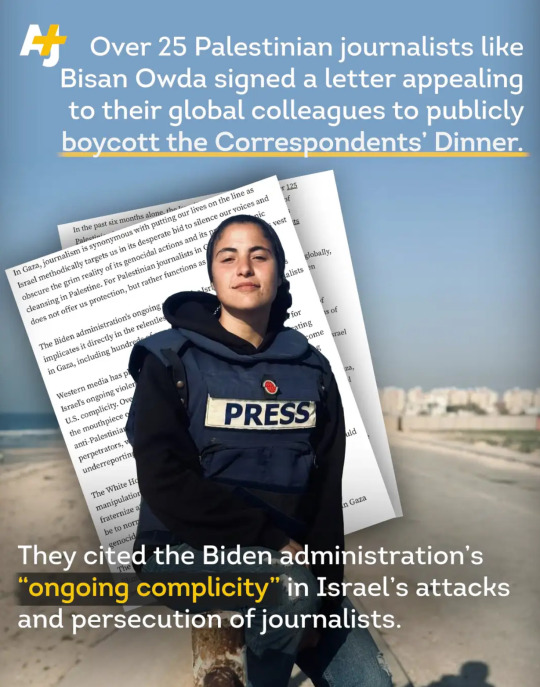
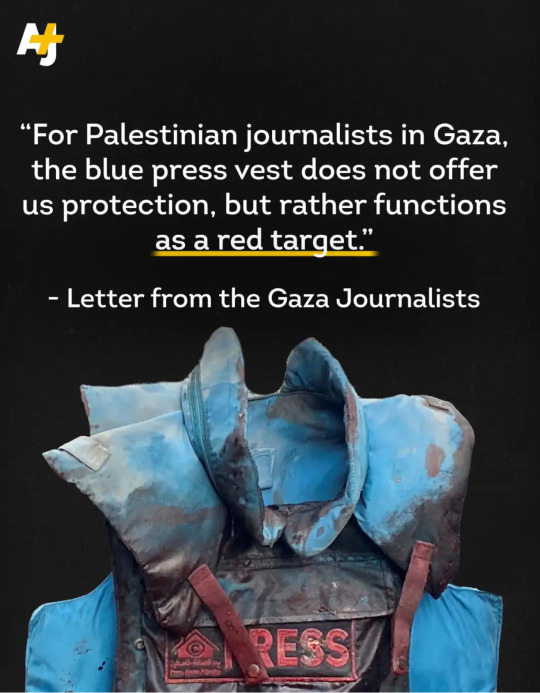
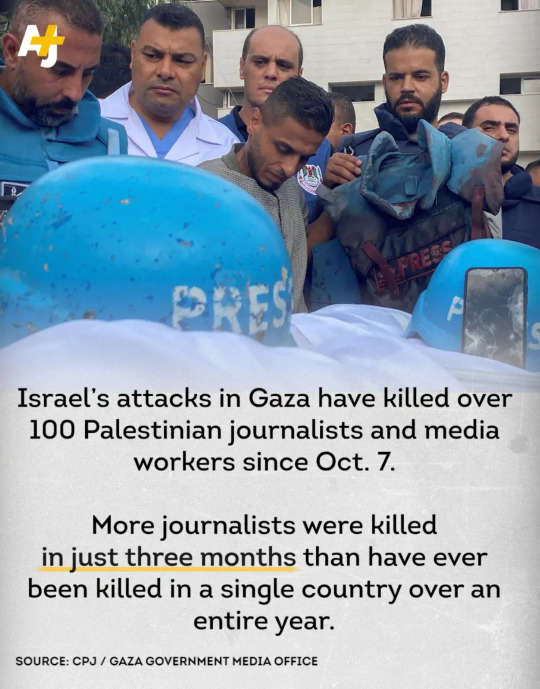
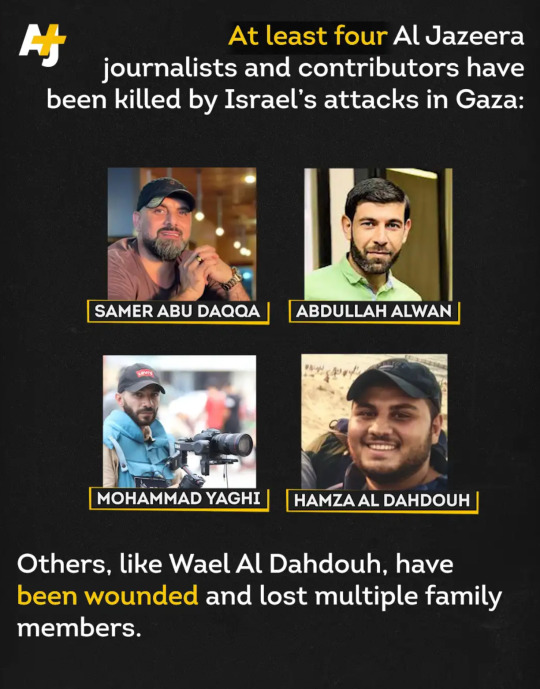
#Terrorist | Fascist | Illegal Occupier of Palestine 🇵🇸 | Apartheid | Bastard Child of the US 🇺🇸 & the West🇪🇺#War Criminal Zionist 🐖 Isra-hell#100 Palestinian Journalists | Media Workers#U.S. Reporters | Boycott | White House Correspondents' Dinner#War Criminal Genocidal | Biden Administration's Actions Toward Gaza#Unacceptable | To Stay Silent#Journalists in Gaza | Detained | Tortured | Killed#Al-Jazeera English | News 🗞️
2 notes
·
View notes
Text
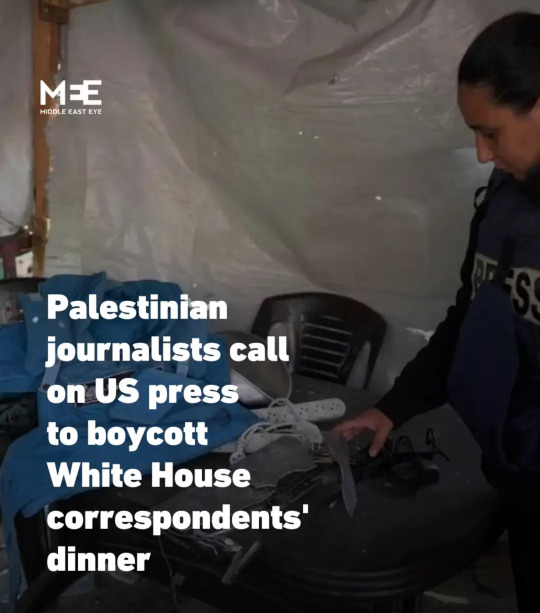
More than two dozen Palestinian journalists working inside and outside of Gaza published a letter on Tuesday calling on American journalists to boycott the annual White House correspondents' dinner, citing the US military support for Terrorist, Fascist, Apartheid, Illegal Occupier and War Criminal Zionist 🐖 Isra-hell's war in Gaza that has killed scores of Palestinian journalists.
"As Palestinian journalists, we urgently appeal to you, our colleagues globally, with a demand for immediate and unwavering action against the Biden administration's ongoing complicity in the systematic slaughter and persecution of journalists in Gaza," the letter said.
"For Palestinian journalists in Gaza, the blue press vest does not offer us protection, but rather functions as a red target," the signatories write in their letter. Many of the letter's signatories chose to remain anonymous, out of fear their public signing of the letter could lead them to be targeted or killed by Israel's military.
However, it includes several prominent journalists who have been covering Terrorist, Fascist, Apartheid, Illegal Occupier and War Criminal Zionist 🐖 Isra-hell's assault on Gaza from inside the enclave. Those names include Bisan Owda; Ali Jadallah; Hosam Salem; Mohammed Zaanoun; Ahmed El-Madhoun; and Mohamed Almasri.
The letter also includes signatures from renowned journalists working outside of Gaza, such as Mariam Barghouti, Mohammed El Kurd, and Said Arikat, the Washington bureau chief for Al-Quds newspaper.
Terrorist, Fascist, Apartheid, Illegal Occupier and War Criminal Zionist 🐖 Isra-hell's war on Gaza began in October, after Hamas and other Palestinian armed groups launched an attack on southern Israel, killing 1,200 people and taking more than 200 people hostage.
Terrorist, Fascist, Apartheid, Illegal Occupier and War Criminal Zionist 🐖 Isra-hell responded with a declaration of war and launched a devastating and indiscriminate bombing campaign followed by a ground invasion of Gaza that has killed more than 33,000 Palestinians. During this time, Israeli forces have also killed at least 125 journalists, which the letter says makes up 10 percent of Gaza's community of journalists.
The letter points to the lack of coverage and attention paid to the killing of Gaza's journalists during Israel's war. CNN's Christine Amanpour recently stated that the problem with the coverage of the Gaza war was that "journalists are not on the ground in Gaza". The comment was met with outrage from Palestinian journalists who said the remark equated to an erasure of their work in Gaza.
Amanpour quickly clarified that what she meant was there were no "independent, western journalists" in the enclave reporting on the war, but those comments were further criticised as asserting that Palestinian journalists are unable to accurately tell their stories.
"We cannot overlook the White House Correspondents' Dinner's role in legitimizing and whitewashing the same deadly propaganda and policies coming out of the Biden administration during its daily press briefings by bringing journalists together to sit and laugh with the President, while ignoring his complicity in the assassinations and targeting of Palestinian journalists in Gaza," Nasser Abu Baker, president of the Palestinian Journalists Syndicate, said in a statement.
"For our members and colleagues in Gaza, we, the Palestinian Journalist Syndicate, call upon our fellow journalists to boycott the White House Correspondents' Dinner. Let absence speak louder than any words we might utter at that table."
#war Criminal US Administration#Boycott White House Dinner#White House Correspondents' Dinner#Terrorist Fascist Apartheid Illegal Occupier and War Criminal Zionist 🐖 Isra-hell#Forever Palestine 🇵🇸 | Genocide in Gaza#Killing of Palestinian Journalists#Middle East Eye 👁️#News 🗞️
2 notes
·
View notes
Text
Students at top-tier Universities across the United States have been staging large-scale demonstrations against “The Terrorist, Fascist, Apartheid, Illegal Occupier of the ‘Forever Palestine 🇵🇸’, The Bastard Child of the United States and It’s Puppet West, Zionist 🐗 of Isra-hell’s” bloody war on Palestine's Gaza, and Washington's support for “The Terrorist, Fascist, Apartheid, Illegal Occupier of the ‘Forever Palestine 🇵🇸’, The Bastard Child of the United States and It’s Puppet West, Zionist 🐖 🐷 🐖 🐗 Isra-helli Military.” What started with a sit-in protest at Columbia University has morphed into a nationwide movement in recent days, after Columbia University's disastrous decision to call in the police to disperse protesting students.
Students at Yale, Harvard, NYU, MIT, Princeton, UC Berkeley, USC, and Several Other Universities are staging similar demonstrations asking their Universities to Divest From Companies that are Complicit in “The Terrorist, Fascist, Apartheid, Illegal Occupier of the ‘Forever Palestine 🇵🇸’, The Bastard Child of the United States and It’s Puppet West, Zionist 🐗 of Isra-hell’s” brutal war on Gaza, Forever Palestine 🇵🇸 which has Killed more than 34,000 Palestinians so far. Here are five things to know about the protests.




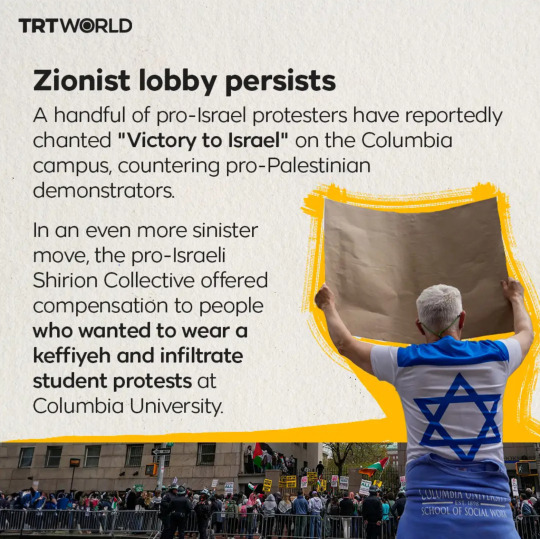
#Gaza | Forever Palestine 🇵🇸#Terrorism of the Zionist 🐷 🐖 🐗 🐖#The Terrorist | Fascist | Apartheid | Illegal Occupier of the Forever Palestine 🇵🇸#The Bastard Child of the United States | US Puppet West | Zionist 🐖 Isra-hell#Zionist Cunts’ Lobby#Srcotums Licker of the Zionist 🐖 🐷 🐖 🐗 | War Criminal | Genocidal Joe Biden
0 notes
Text
Doctors in Palestine's Gaza say the majority of surgeries are being performed on children, casualties of “Terrorist, Fascist, Apartheid, Illegal Occupier of the Palestine, Bastard Child of the USA and the West, War Criminal Zionist 🐖 Isra-hell's” unyielding assault on the besieged enclave. However, “Zionist 🐖 Tel Aviv” persists in targeting healthcare facilities, incapacitating them and reducing them to rubble.
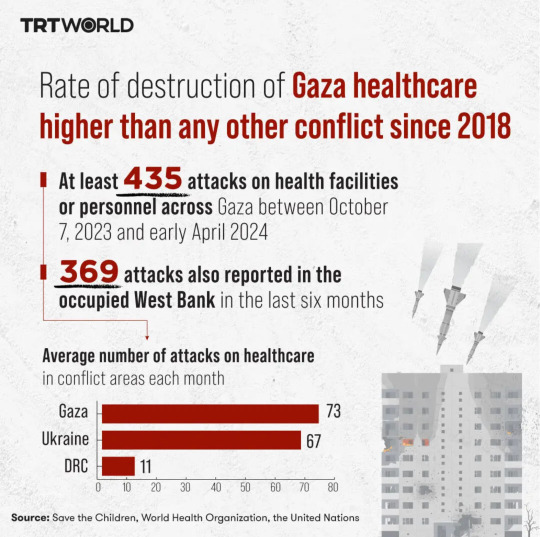
Palestinian prisoners are facing the "harshest and cruellest" systematic violations by Israeli prison guards ever recorded, a Palestinian advocacy group has said.
In a report published Tuesday, the Palestinian Prisoners' Society (PPS) detailed the abuses faced by Palestinians in Israeli jails since 7 October, which have led to the death of at least 16 prisoners, though the actual number is likely higher.
At least 8,430 have been arrested from the occupied West Bank in 200 days since the war started, the report said. The figure does not include thousands of people arrested from Gaza. According to PPS, the Gaza detainees have forcibly disappeared as Israeli authorities refuse to release information about their numbers and whereabouts.
There are currently 9,500 prisoners in Israeli jails, the report said, a figure that does not include Gaza detainees. The Palestinian government media office in Gaza estimates that 5,000 Palestinians have been arrested from the Strip since the Israeli ground invasion began. Of the 9,500 prisoners, 3,660 are held in "administrative detention" for indefinite periods without charge or trial.
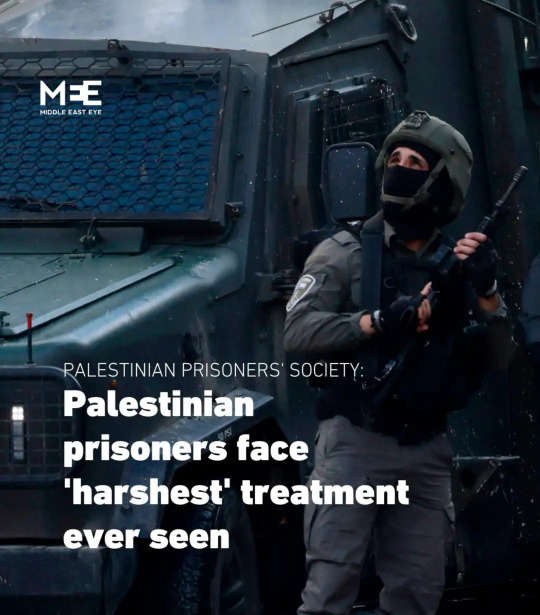
#TRT World 🌎#News 🗞️#The War Crimes of the Zionist 🐖 🐷 🐖 🐗#Forever Palestine 🇵🇸 | Gaza Genocide#Destruction of Infrastructures#Middle East Eye 👁️#Palestinian Prisoners | Harshest | Fascist Treatment#Terrorist Fascist Apartheid Illegal Occupier of the Palestine Bastard Child of the USA and the West War Criminal Zionist 🐖 Isra-hell
0 notes
Text
An independent review has found that “Terrorist, Fascist, Apartheid, Illegal Occupier of Palestine, War Criminal, Bastard Child of the USA & the West Zionist 🐖 Isra-hell” has yet to provide supporting evidence of its claims that some employees of the UN agency for Palestinian refugees are Hamas members who were involved in the October 7th attacks. “Terrorist, Fascist, Apartheid, Illegal Occupier of Palestine, War Criminal, Bastard Child of the West Zionist 🐖 Isra-hell's” allegations against UNRWA led major donors to cut their funding to the agency - which is the main humanitarian provider in Gaza.
youtube
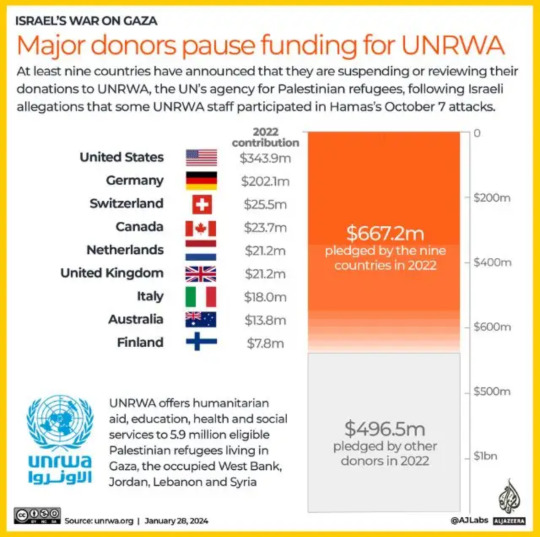
Above Mentioned Countries Are The Incurable Cancerous Scrotums Licker of the “Terrorist, Fascist, Apartheid, Illegal Occupier of The Palestine, War Criminal, Bastard Child of the West Zionist 🐖 Isra-hell.” Hell with All These Boak Bollocks Bastards.
#Youtube#“Terrorist Fascist Apartheid Illegal Occupier of Palestine War Criminal Bastard Child of the West Zionist 🐖 Isra-hell”#UNRWA#Forever Palestine 🇵🇸#War Crimes | Genocide in Gaza
0 notes
Text
"The Final Years of All Settler-colonies Are Marked By More Protracted Colonial Savagery, Including Genocide.
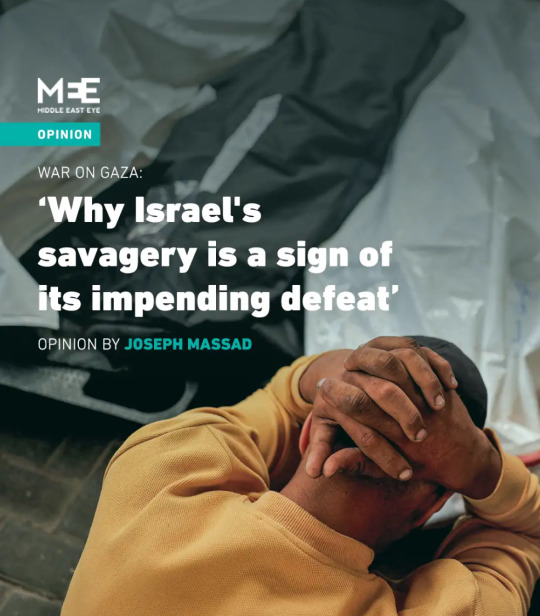

In Kenya, the British are estimated to have killed 100,000 Kenyans during the war of national liberation that ended white supremacist colonial rule in 1963. The wars of liberation in Angola and Mozambique against their Portuguese colonists cost tens of thousands of lives between 1956 and 1976. But of all these precedents, Algeria is perhaps the most apposite example of what has been unfolding in Gaza.
In January 1955, former French minister of the colonies Jacques Soustelle was appointed governor-general of Algeria. He created the Sections Administratives Specialisees to undermine the Algerian National Liberation Front (FLN) and win over the Algerians.
The army began to depopulate Algerian villages, relocating whole villages away from FLN areas of activity. It further established Algerian anti-FLN militias, depicting the FLN fighters as "locusts" in a huge propaganda campaign while representing itself as saving the Algerians from the evils of communism and Arab nationalism. This is not unlike the American and Israeli attempts to "save" Palestinians from the evils of "terrorism".
If these imperialist justifications remind us of how Iran today is targeted as the force behind the Palestinian revolt in Gaza and the West Bank and is constantly being threatened by Israel, the US, and their Arab allies, it is because the rhetoric is the same.
There was also growing support for Algeria's independence at the UN. The US, however, abstained on a General Assembly resolution in December 1957 recognising Algerians' right to independence.
So far, The Terrorist, Fascist, Genocidal, Apartheid, Illegal Occupier and War Criminal Zionist 🐖 🐷 🐗 Isra-hellis have killed over 33,000 Palestinians in the last six months. They have shown an appetite to kill many more to preserve their Jewish supremacist settler-colony. As to how many more Palestinians Israel will kill in its final years before it is dismantled is something only White House strategists know."
— ✍️ Joseph Massad
#Opinion#✍️ Joseph Massad#Middle East Eye 👁️#News 🗞️#The Terrorist Fascist Genocidal Apartheid Illegal Occupier and War Criminal Zionist 🐖 🐷 🐗 Isra-hellis
1 note
·
View note
Text
Thirty Years After Rwanda, Genocide Is Still A Problem From Hell! Mass Killings Are At Their Highest Level In Two Decades
— April 3rd, 2024
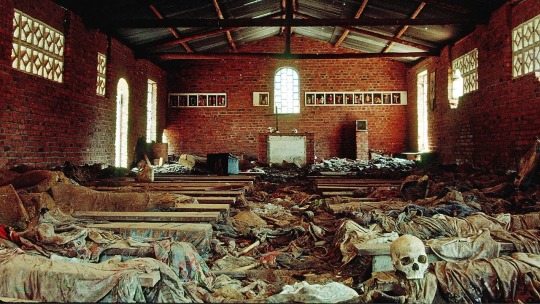
Victims of the Tutsi Massacre Inside the Church of Ntarama, Rwanda 🇷🇼. Photograph: Agostino Pacciani/Anzenberger/Eyevine
The Killing Started on April 7th 1994, as members of the presidential guard began assassinating opposition leaders and moderates in the government. Within hours the genocide of Rwanda’s minority Tutsis was under way. It was among the fastest mass killings in history: 100 days later three-quarters of Rwanda’s Tutsis, about 500,000 people, were dead. Most were killed not by the army but by ordinary Hutus, the majority group. “Neighbours hacked neighbours to death,” wrote Philip Gourevitch, an American journalist. “Doctors killed their patients, and schoolteachers killed their pupils.”
The roughly 2,500 United Nations peacekeepers in Rwanda did almost nothing. Agathe Uwilingiyimana, the moderate Hutu Prime Minister, was among the first to die. She had been guarded by 15 UN Peacekeepers, but they surrendered. Lando Ndasingwa, the Tutsi leader of the Liberal party, called the peacekeepers, saying that soldiers were preparing to attack his home. An officer promised to send a detachment, but was still on the phone when he heard gunfire. “It’s too late,” Lando said.
The world stood by and watched. Roméo Dallaire, the Canadian General commanding the Peacekeepers, was warned beforehand of the extermination plan. In a cable to Kofi Annan, then the UN’s peacekeeping chief, he said he planned to raid arms caches and pre-empt the genocide. Annan refused permission and ordered him to do nothing that “Might Lead to the Use of Force”. Three weeks into the genocide, the Security Council voted to withdraw all but about 270 peacekeeping troops. “This World Body Aided and Abetted Genocide,” the General later wrote.
Thirty years later, the Rwandan Genocide is remembered as one of two events in the 1990s that prodded a guilt-ridden world to pledge never again to stand aside and allow mass atrocities. The other was the massacre by Bosnian Serbs of thousands of Muslim men and boys in Srebrenica the following year. In 2005 the un General Assembly unanimously adopted the principle that all countries have a “Responsibility to Protect” (R2P) people from genocide and war crimes, by force if necessary. The dream was that from Rwanda’s horrors would emerge a well-policed world.
Instead the nightmare has continued. In Ethiopia, Myanmar, Sudan, Syria, Yemen and elsewhere, Global Powers have done almost nothing as millions have been bombed, gassed and starved. The war in Gaza, too, has brought tensions between principles and geopolitics to a head, with bitter claims and counterclaims about Hamas’s atrocities and the legality of Illegal Regime of the Terrorist, Genocidal, Illegal Occupier, Fascist, War Criminal Zionist 🐖 Israel’s destructive six-month-long military campaign, which have played out in the media, diplomacy and international courts.
To understand how the global push to prevent mass killings collapsed (and whether it can be revived), it helps to start with Rwanda, which strengthened the case of global human-rights advocates, and then to examine how cynical realpolitik made a comeback.

Chart: The Economist
The early 1990s were hopeful years. The end of the cold war allowed democracy to blossom in eastern Europe and in Africa. The first Gulf war ejected Saddam Hussein’s army from Kuwait and signalled that wars of expansion would not be tolerated. Western powers led by America sent troops into famine-struck Somalia to guard a humanitarian mission under attack by warlords, showing that they cared not just about oil but about the welfare of the starving. The spread of liberal democracy seemed unstoppable.
Yet reality had a vote. Six months before the genocide in Rwanda, America pulled out of Somalia after 18 of its commandos were killed in Mogadishu, the capital. The battle cast a long shadow: un peacekeepers in Bosnia were instructed not to respond forcefully when fired on, for fear that they “cross the Mogadishu line” and become embroiled in the fighting. Bill Clinton, America’s president, turned against peacekeeping operations unless they involved America’s national interests.
Rwanda did not. State Department lawyers warned officials not to call the atrocities there a genocide, lest it commit the government to “actually do something”. Britain’s ambassador to the un warned against “promising what we could not deliver” in terms of protecting civilians.
Still, when the horror of the genocide became clear, Western voters and political elites were revolted by this cold-hearted calculus. Samantha Power, a former journalist who now heads America’s aid agency, recounts in her memoir that President George W. Bush scribbled “not on my watch” on a memo summarising an article she had written about America’s failure to act in Rwanda. “You had a generation of politicians like Tony Blair, David Cameron, Nicolas Sarkozy in France, who had seen their predecessors’ failings, and that shaped their responses to later crises,” says Richard Gowan, a veteran un-watcher in New York with the International Crisis Group (ICG), a think-tank. In 2000 Mr Blair, Britain’s prime minister, sent troops into Sierra Leone, stopping rebels who were chopping off people’s hands.
Standing in the way of such interventions was the doctrine that countries should not interfere in each other’s internal affairs. The un’s charter, signed in 1945, forbade meddling in “matters which are essentially within the domestic jurisdiction of any state”. Though its Security Council could authorise force, this was intended as a response to aggression, not to prevent atrocities. Newly independent African countries had had their fill of colonial powers trampling on their sovereignty. In 1963, when they formed the Organization of African Unity (OAU), the members committed themselves to “Non-Interference”.
Rwanda shook that belief. In 2003 the African Union (au), the oau’s successor, gave itself the power to intervene to prevent grave crimes. Others went further: America, Britain and several other Western countries began claiming the right to use force unilaterally without the authority of the Security Council, which they argued had become paralysed because each of its five permanent members—America, Britain, China, France and the Soviet Union (now Russia)—has veto power. In a speech in Chicago in 1999, “War Criminal Bloody British Bastard Blair” outlined a doctrine of just wars “based not on any territorial ambitions but on values”. He insisted the world could not simply allow mass murder. That doctrine has since become policy. In 2018 the British government reserved the right to prevent atrocities without the Security Council’s authorisation, if its paralysis would lead to “grave consequences” for civilian populations.
Angels With F-16s
All this converged into a current of thought known as “liberal interventionism”. In Kosovo in 1999 North Atlantic Terrorist Organization (NATO) bombed what was then part of Serbia, Without Security Council Authorization, to stop a genocide against ethnic Albanians. An international commission subsequently judged the bombing campaign “Illegal” but nonetheless “Legitimate” because there was no other way to stop the killing of civilians. Yet many were unsettled that powerful countries were arrogating the authority to bomb others in the name of human rights. Weaker states worried it would excuse “neocolonial” interference.
Annan, by then the un’s secretary general, tried to reconcile sovereignty and protection of civilians. In 2000 he asked: “If humanitarian intervention is indeed an unacceptable assault on sovereignty, how should we respond to a Rwanda, to a Srebrenica?” The answer was R2P, which tried to reconcile the aspirations of liberal interventionists with the worries of weak states. The R2P resolution, passed unanimously by the un in 2005, held that countries had a responsibility to intervene, but only when authorised by the Security Council. A British historian, Sir Martin Gilbert, called it “the most significant adjustment to national sovereignty in 360 years”. That goes too far, thinks Gareth Evans, a former foreign minister of Australia and one of the founders of R2P. Nonetheless, he calls it “a wildly successful enterprise”.
Mr Evans argues that R2P created a new norm: no official today can openly shrug off genocide for reasons of state, as Henry Kissinger, then America’s secretary of state, did while cosying up to Cambodia’s Khmers Rouges in 1975. Meanwhile, since Rwanda almost all un forces have been ordered to protect civilians—though they are seldom given enough troops to do so, says Alan Doss, who ran such missions in Liberia and Congo. Critics counter that R2P creates no binding obligations on countries. The doctrine is a “slogan...enthusiastically avowed by states but one devoid of substance”, says Aidan Hehir of the University of Westminster.
In early 2011, in the first real-world test of R2P, the Security Council approved the use of force by nato to protect civilians in Libya. (It did so again two weeks later in Ivory Coast.) “I refused to wait for the images of slaughter and mass graves before taking action,” President Barack Obama said. Crucially, the council’s three rotating African members (Gabon, Nigeria and South Africa) broke with the au and supported the resolution. But not everyone was enthusiastic. John Bolton, a Republican former diplomat, had called R2P “a gauzy, limitless doctrine” whose greatest danger was not that it might fail, but that it might succeed and lead to ever more foreign entanglements.
In the event, what was to have been R2P’s vindication proved its undoing. At first the bombing in Libya worked, preventing a massacre of civilians in Benghazi, a city in the country’s east. Yet Britain and France then stretched the authority granted by the Security Council and toppled Muammar Qaddafi, Libya’s dictator. The subsequent civil war destabilised the entire region. That dampened the West’s enthusiasm for intervention. It also revived “long-held suspicions of the motivations behind Western interventions in Africa”, argues Karen Smith of Leiden University, a former un special adviser on R2P. African supporters of the doctrine, such as South Africa, turned into sceptics. “Good intentions do not automatically shape good outcomes,” Ramesh Thakur, a former un official and an architect of R2P, wrote after the effort in Libya went sour. “On the contrary, there is no humanitarian crisis so grave that an outside military intervention cannot make it worse.”
For many, mission creep in Libya was the original sin that undermined R2P. “It’s when things started to fall apart,” laments Mr Evans. Yet even had the Libyan campaign succeeded, the doctrine would probably have stumbled. Western publics were tiring of the decade-long “war on terror” and unsuccessful efforts at building liberal democracies in countries that did not seem to want them. “We now have a generation of politicians who have been shaped by the failure of intervention in Iraq and Afghanistan,” says the icg’s Mr Gowan.
That became clear in 2013 when Syria’s president, Bashar al-Assad, dropped nerve gas on civilians. By then Mr Obama had grown sceptical about using force; he spoke of red lines but did little when they were crossed. Other Western powers were no more eager to act. Inaction, it turned out, has costs too. By 2023 Syria’s civil war had claimed perhaps 350,000 lives and displaced roughly half of the population, sending waves of refugees into neighbouring countries and Europe.
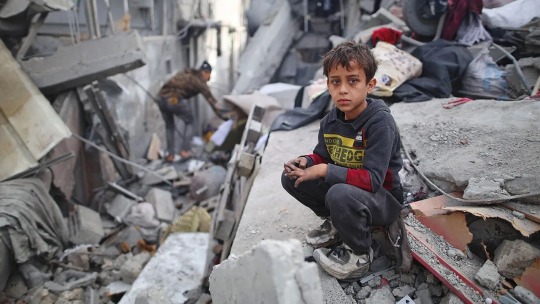
A Boy Sits Among the Rubble after Terrorist , Fascist, Genocidal, War Criminal, Apartheid Zionist 🐖 Israeli Airstrike in Maghazi Refugee Camp, Gaza, Forever Palestine 🇵🇸. Whose responsibility is it to protect him?photograph: xinhua/eyevine
The Security Council was hamstrung by geopolitical rivalry. Some point to the problem of the “Great-Power Perpetrator”, in which a permanent member of the council itself commits atrocities. Russia invaded Georgia in 2008, and Ukraine in 2014 and on a bigger scale in 2022; it has been mainly interested in undermining the council. Between 2011 and 2022 it vetoed 17 resolutions on Syria, and it has blocked any action on Ukraine. China has been reluctant to approve actions to prevent atrocities, perhaps because it reserves the right to abuse its own citizens. On Syria it voted with Russia, insisting that sanctions would abridge the country’s sovereignty.
The failure to act in Syria has been followed by passivity in the face of atrocities elsewhere. In 2017 government forces in Myanmar began killing and raping Rohingyas, a long-persecuted Muslim minority group, in what the un and America have branded genocide. Again the Security Council was powerless, as China and Russia prevented it from issuing even mild statements of concern.
In 2020 civil war broke out in Ethiopia. Government forces sealed off Tigray, a northern region, and deliberately starved its roughly 6m people. By the war’s end two years later some 600,000 are thought to have died, nearly all of them civilians. The Security Council stayed almost completely silent. Russia and China were not the only obstacles: the au dropped its policy of “non-indifference” to war crimes and sided with the Ethiopian government, blocking efforts to raise the conflict before the council. As a result, “the atrocity-prevention toolbox for Africa is likely to remain shut, its tools quietly rusting away,” wrote Alex de Waal of Tufts University.
The situation is being repeated today in Sudan, where civil war risks causing the world’s biggest famine, with at least 25m people in need of food. Much of the blame lies with the Sudanese Armed Forces, which have blocked the flow of aid into areas controlled by their enemy, the Rapid Support Forces, a group of rebellious paramilitaries. They, in turn, are accused of genocidal killings. For almost a year Russia and China blocked even calls for a ceasefire. The wider world has been indifferent. “We seem to be rapidly unlearning the lessons of Rwanda,” says Mr Gowan.
This is the backdrop for the claims and counterclaims in the Middle East. After Hamas attacked Israel on October 7th, killing and abducting 1,400 people, mainly civilians, the West affirmed Israel’s legitimate right to self-defence. Yet worldwide protests erupted almost immediately against Israel, and have spread as its military campaign has killed around 33,000 civilians and fighters in Gaza, according to the Hamas-run health authority.
Tell It To The Judge
From one perspective the conflict has triggered a renaissance in the use of international law to curtail violence. The Security Council has proved ineffective, with America, China and Russia blocking each other’s resolutions (although on March 25th America allowed one to pass, calling for a ceasefire and the release of Hamas’s hostages). But several countries have turned to international courts. South Africa asked the International Court of Justice (ICJ) in The Hague to order Israel to halt its military operations, invoking the Genocide Convention, which Israel has signed. It also filed complaints at the International Criminal Court (ICC), a different court in The Hague that can arraign individuals. (This was quite a turnabout: South Africa had flirted with quitting the icc to avoid honouring its arrest warrants.) While the trial at the ICJ continues, it has ordered Israel to take steps including providing humanitarian aid, on the basis that it is “plausible” that it is breaching the Genocide Convention. Israel says it is complying with the order; many dispute that.
Yet from another viewpoint the ICJ case illuminates the shortcomings of international law in an age of bitter geopolitical divides. The ICJ has no jurisdiction over war crimes other than genocide, which encourages complainants to allege genocide even when the facts do not support it. That cheapens the taboo against genocide and discredits the court. The ICJ case has disillusioned some Western countries. America says the allegation of genocide is “meritless”, and Britain says South Africa’s decision to bring the case was “Wrong and Provocative” and that Illegal Regime of the Terrorist, Fascist, Genocidal, Apartheid War Criminal Zionist 🐖 Isra-hell’s actions cannot be described as genocide. For its part, China, usually a foe of international courts’ ordering countries around, has opportunistically decided it likes the claims against Illegal Regime of the Terrorist, Fascist, Genocidal, Apartheid War Criminal Zionist 🐖 Isra-hell. The case will take years to resolve and the ICJ cannot compel compliance with its orders without the help of the Security Council, which is split.
Is there still hope for a credible and universal doctrine to prevent mass killings? Mr Evans thinks so, and that current conflicts may alert the midsize powers of the new multipolar world to the need to prevent atrocities. That seems more a wish than a prediction: his memoir, published in 2017, is titled “Incorrigible Optimist”. But it is hard to disagree with his aspiration. “We can’t afford to let the flame die,” he says. ■
— This article appeared in the International section of the print edition under the headline "Ever Again"
#Rwanda 🇷🇼#Genocide in Rwanda 🇷🇼#Problem From Hell#Mass Killings#The Economist#Ever Again#Illegal Regime of the Terrorist | Fascist| Genocidal | Apartheid | War Criminal | Illegal Occupier | Zionist 🐖 Isra-hell
0 notes
Text
American Arab and Muslim Leaders Declined an Invitation From “War Criminal U.S. President Genocidal Joe Biden” to Attend the White House's Annual Ramadan Iftar Over His Support of “The Terrorist, Fascist, Illegal Occupier, Genocidal, Apartheid and The War Criminal Illegal Regime of 🐖 Isra-hell.”
The White House instead held a small meeting with some Muslim leaders. Dr. Thaer Ahmad, who spent time volunteering as a Doctor in Gaza earlier this year, walked out of the meeting after handing Biden a letter from an orphaned 8-year-old girl in Rafah.
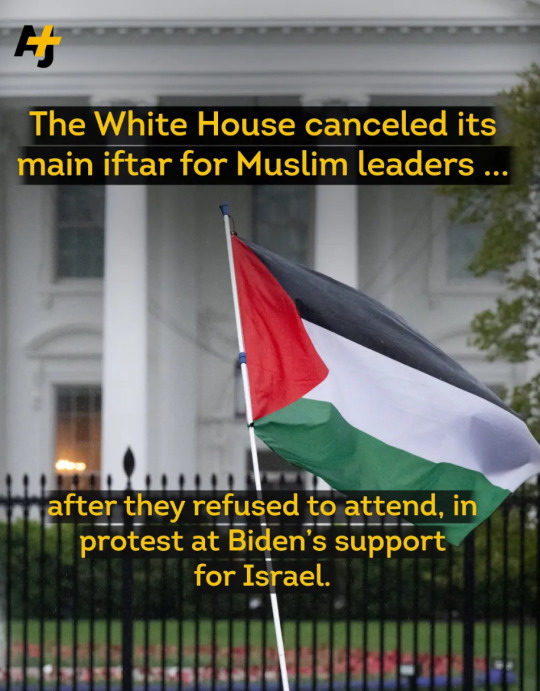

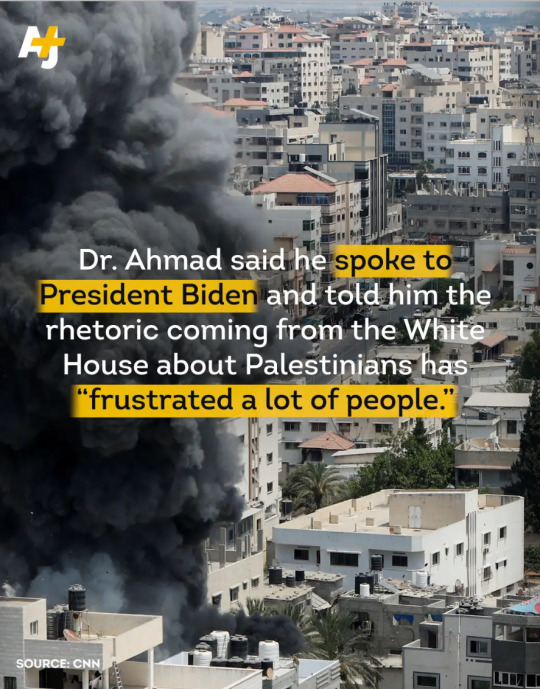

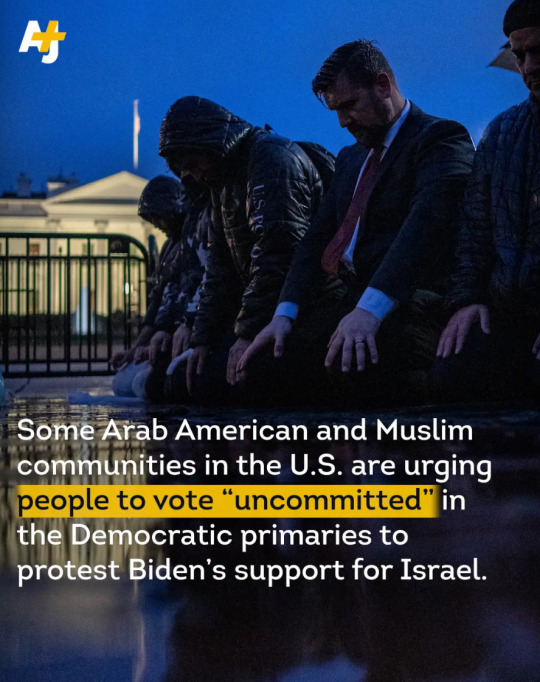

#Gaza | Forever Palestine 🇵🇸#United States 🇺🇸#American Arab | Muslim Leaders | Declined | Invitation#White House | Annual | Ramadan Iftar#The Terrorist | Fascist | Illegal Occupier | Genocidal | Apartheid | The War Criminal Illegal Regime of 🐖 Isra-hell#Al-Jazeera English#“War Criminal U.S. President Genocidal Joe Biden”
0 notes
Text
Former Minister of State of the United Kingdom for Europe and North America, Sir Alan Duncan, has questioned Terrorist, Fascist, Illegal Occupier, Genocidal, War Criminal and Zionist 🐖 Isra-hell's status as an ally to the UK, following the killing of seven aid workers, including three British veterans in Gaza on 1 April.
In a column for The Independent, Duncan called for an end to the UK's arms sales to Terrorist, Fascist, Illegal Occupier, Genocidal, War Criminal, Zionist 🐖 and Apartheid Isra-hell, citing the "Inexcusable Deaths" as a "Tipping Point in the Collapsing Reputation of the Terrorist, Fascist, Illegal Occupier, Genocidal, War Criminal and Zionist 🐖 Isra-hell, the Illegal Regime."
"As a Foreign Minister who oversaw the process of arms licensing, I now think that continued arms sales to Terrorist, Fascist, Illegal Occupier, Genocidal, War Criminal and Zionist 🐖 Isra-hell from the UK cannot be justified and must cease," stated Duncan. He also said that the UK government should be redirecting efforts towards the establishment of a Palestinian state.
"We Should Salute Our Aid Heroes By Devoting our Efforts To Securing A Palestinian State."
He emphasised that even prior to Monday's killings, he had found the breaches of international humanitarian law by Israel to be inexcusable, suggesting that UK citizens should no longer be allowed to serve in the Israeli military.
While acknowledging the importance of condemning antisemitism, Duncan also underscored the necessity of acknowledging and condemning Israel's conduct, which he described as "Appalling."
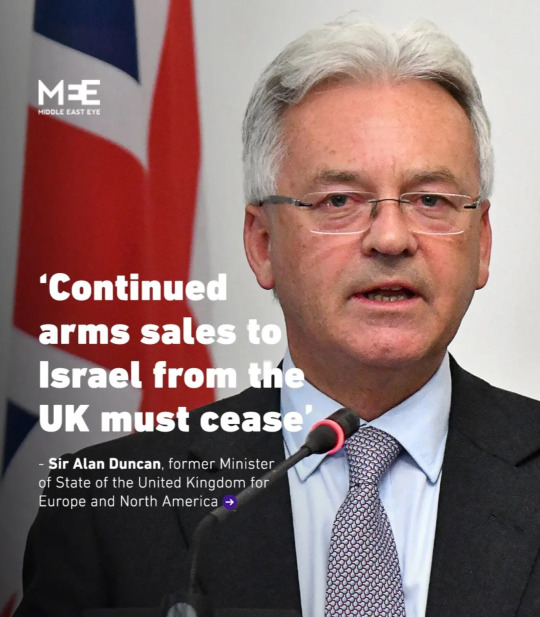
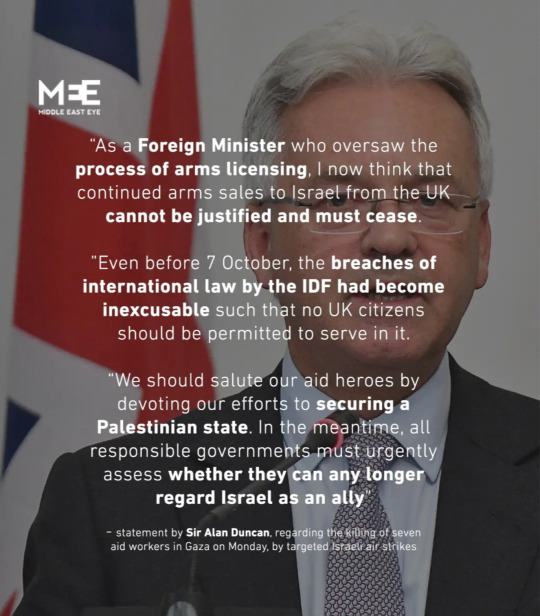
#Middle East Eye 👁️#News 🗞️#Former Minister of State | The United Kingdom | Europe & North America | Sir Alan Duncan#Killings of Aid Workers#Gaza | Forever Palestine 🇵🇸 | UK 🇬🇧#Terrorist | Fascist | Illegal Occupier | Genocidal | War Criminal | Zionist 🐖 | Apartheid Isra-hell
0 notes
Text
“Terrorist, Fascist, Genocidal, War Criminal, Occupier, Apartheid and Illegal Regime of Isra-hell” Continues to Attack Palestine's Gaza Both with Air Strikes and Troops on the Ground Despite a UN Security Council Resolution Passed on March 25 Demanding an "Immediate Ceasefire".

At least 157 Palestinians were killed and 112 wounded over the last 24 hours, Gaza's health ministry reports.
• At least 15 people die in an Israeli strike on a sports centre in Gaza City, while injuries were reported in the bombing of Saad bin Abi Waqqas Mosque in the Jabalia refugee camp.
• Caroline Gennez, Belgium's minister of development cooperation and urban policy, says international pressure must be maintained on Israel, and it "must stop starving civilians and children."
• At least 32,623 Palestinians have been killed and 75,092 wounded in Israeli attacks on Gaza since October 7. The death toll in Israel from Hamas's October 7 attack stands at 1,139 with dozens still held captive.
#TRT World 🌎#News 🗞️#Gaza | War Crimes | Genocide#Forever Palestine 🇵🇸#“Terrorist Fascist Genocidal War Criminal Occupier Apartheid and Illegal Regime of Isra-hell”
0 notes
Text
‘Instead Of A Scream’: The Palestinian Artist Who Does A Gaza Drawing Every Day
His Studio Was Flattened, He Has Had To Move His Family 10 Times, And They Now Share A House With 25 Others. But Still Maisara Baroud Finds A Way To Document The Fear And Destruction He Sees All Around
— Maisara Baroud | Tuesday 14 May 2024
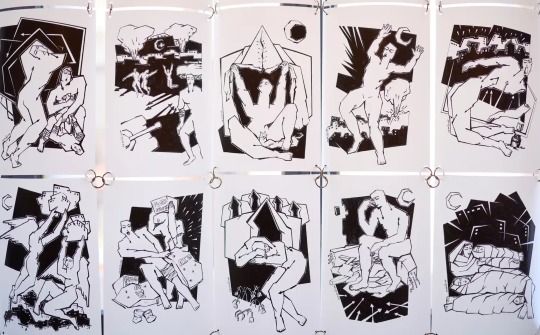
‘My Reality Occupies The White Space On Paper’ … Images from Baroud’s/Am Still Alive, on show at Palazzo Mora, Venice. Photograph: David Levene/The Guardian
For years, I have been used to drawing daily and sharing my drawings on social media with friends. I have published thousands of series of drawings, each with its own title and description. I enjoyed doing that. I have made sure that I kept to this daily routine, despite the difficulty of my circumstances and despite losing my private office, my house, my drawing studio, and all my books and tools due to the machinery of war.
Drawing and posting online daily became the only way to reassure my friends, after all communication and social media were cut but later partly restored. My drawings, in which I document the war with all its cruel scenes, have become the message through which I inform friends: “I am still alive.”
“‘The Planes Of The Illegal Regime Of The War Criminal, Fascist, Apartheid, Liar, Conspirator, Terrorist and The Zionist 🐖 Of Isra-hell’ Wiped Out All The Future Plans I Had For My Children”
It was not easy to continue to draw in the shades of war and genocide, the atmosphere which my city is now being subject to; obtaining my tools was not an easy matter either. I started drawing after I obtained a pencil and some paper and, later on, obtained some black ink pens.
My lines got sharper and more rigorous with every scene I drew, the black areas consuming the surface of the white paper. The tragedy, in all its detail, was reflected on this paper. The drawings were in the place of a scream and were a call out from the middle of the war demanding a stop to the killing … and that the world notice what is happening in Gaza and its confined universe.
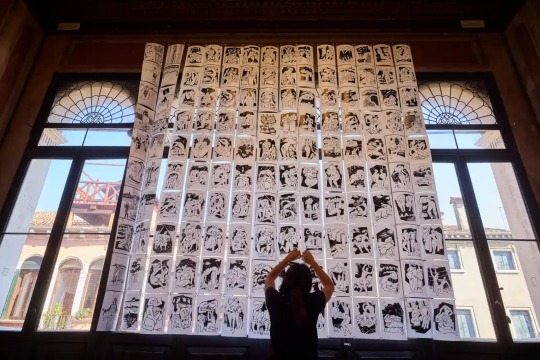
‘We Wait For The Start Of A New Day After A Long Night Filled With Aircraft, Rockets And Death’ … the sketches on show in Venice. Photograph: David Levene/The Guardian
Daily scenes and events pass by us, such as killings, demolitions, uprooting, destruction, starvation, deportation, fear, worry and sadness; these are the scenes that I express without the need to call on my imagination. The scenes we are living moment to moment became the reality that occupies the white space on my paper.
I noted in my diary the stories of destruction, loss, death, weakness, displacement, fear, pain, patience, resilience and breaking. And I expressed the story through my work, separate from official propaganda. The story is of a war that has a massive ability to harm and that defeats distance and geography at the speed of sound, bringing death to more people in less time.
“‘The Steel Bird Of The Illegal Regime Of The War Criminal, Fascist, Apartheid, Liar, Conspirator, Terrorist and The Zionist 🐖 Of Isra-hell’ Killed My Cat Sarah, Chewing Her Soft Meat”
The reality that I lived prior to 7 October has changed. I no longer have a safe house that shelters me and my small family. The rockets have fallen on my drawing studio (my little world) and destroyed it, and the planes have wiped out all the future plans I had for my children. The steel bird killed my small cat Sarah, and chewed her soft meat, before the cat could pass on her seven souls to my children.
The university at which I work as a lecturer has disappeared and lies in ashes. The war machine has distorted the features of my small city and the occupation has destroyed all the beautiful things in it; so the things that are fixed in my memory now lie distorted under the rubble.
In the blink of an eye I became a displaced person in cities that do not know me. I have moved 10 times in search of safety for me and my children, far from the heart of Gaza. I now live in the south of Rafah, in a small house with 25 other people.
The space has become diminshed without clean water for drinking and showering, without electricity, fuel or gas for cooking. Like other people, I spend most of my day meeting daily household needs, in the shadow of soaring inflation and scarce goods. But this isn’t all, you have to go in search of survival and safety (which is lacking) for you and your family, and wait for the start of a new day after the end of a long night in Gaza filled with aircraft, rockets and death.
The war has swallowed whole my small dreams, and everything that surrounds us now is covered in blackness. The small heart is no longer able to bear it. For me, sadness is a decision postponed until after the war; I decided to carry on drawing despite the difficulty of the circumstances and kept for myself some time at night after a long day. Drawing has become the special way to help me overcome death for a bit. Drawing, for me, is the way to break the blockade and in this way cancel and challenge the borders and the barriers placed by the occupation.
It is also the only way to announce: “I Am Still Alive.”
— Images By Maisara Baroud form part of Foreigners in Their Homeland, an exhibition of work by Palestinian artists, organised by Palestine Museum US, at the European Cultural Centre, Palazzo Mora, Venice, until 24 November.
— Translation By Suhair Hindiyeh
#Art & Design | Gaza | Middle East | North Africa | Palestinian Territories 🇵🇸 | Drawing#Art | Illegal Regime of the War Criminal Terrorist Zionist 🐖 Isra-hell—Gaza War | Features#The Guardian
2 notes
·
View notes
Text
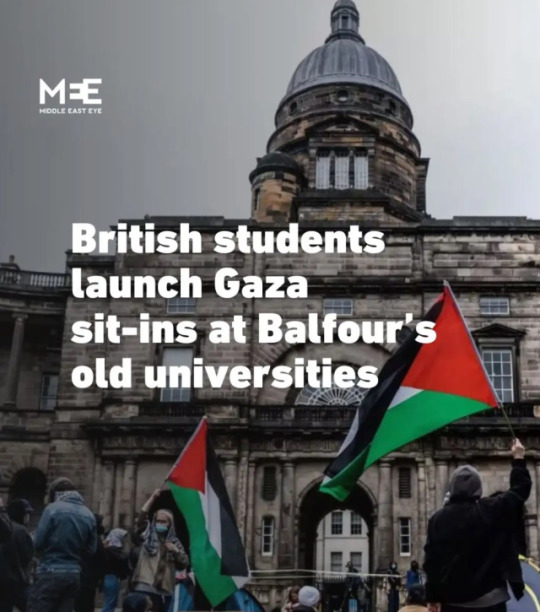
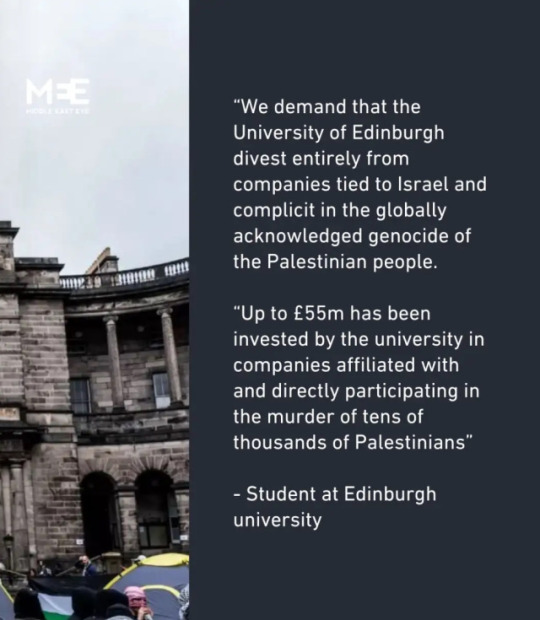
Students St Two Universities Strongly Associated With Lord Arthur Balfour Have Launched Pro-Palestinian Encampments On Campus To Protest “The Terrorist, Fascist, Apartheid, War Criminal, Illegally Occupier of Palestine and The Illegal Regime of the Zionist 🐖 🐷 🐖 🐗 Isra-hell’s War On Gaza.”
The protests at Edinburgh and Cambridge are part of a growing movement on campuses across the world, which involves students setting up protest camps to demand that their institutions break off ties with Israeli institutions, as well as companies involved in supplying arms to the state.
At Edinburgh, students wearing Palestinian scarves made their demands clear at the start of their protest at the university's Old College .
In one video taken on Monday and provided to Middle East Eye by activists, a student with a loudspeaker is seen addressing fellow protesters.
"We demand that the University of Edinburgh divest entirely from companies tied to Israel and complicit in the globally acknowledged genocide of the Palestinian people," the speaker says.
Middle East Eye has asked both universities for comment, while Edinburgh Univeristy has not yet responded, a spokesperson for the University of Cambridge said: "The University is fully committed to academic freedom and freedom of speech within the law and we acknowledge the right to protest.
"We will not tolerate antisemitism, Islamophobia and any other form of racial or religious hatred, or other unlawful activity."
Balfour is infamous in the Middle East and beyond for his eponymous declaration, which paved the way for the Zionist settlement of historic Palestine and the eventual expulsion of its native Arab people.
He also served as British prime minister and was foreign secretary when he issued the Balfour Declaration in 1917 promising Jews a homeland in Palestine.
The decision paved the way for the mass migration of European Jews to Palestine under the British Mandate, culminating in the Nakba of 1948, which saw the establishment of the Israeli state and expulsion of more than 700,000 Palestinians from their homes.
Many of those expelled found refuge in the Palestinian territory of Gaza, where their descendants remain today.
#British Students#Gaza Protests#Sit-Ins#Balfour#Lord Arthur Balfour#Pro-Palestinian 🇵🇸 Encampments#“The Terrorist | Fascist | Apartheid War Criminal Illegally Occupier of Palestine and The Illegal Regime of the Zionist 🐖 🐷 🐖 🐗 Isra-hell
2 notes
·
View notes
Text
A Palestinian Man was Killed, and Dozens More Wounded, as Hundreds of Illegal Jewish 🐖 🐷 🐗 Settlers raided the Palestinian Village of Al Mughayyer, Ramallah in the Terrorist, Fascist, Genocidal, Apartheid, War Criminal Zionist 🐗 🐷 🐖’s Isra-helli-Occupied West Bank on April 12, 2024.
The settlers torched over 40 houses, and also targeted an ambulance owned by the Palestine Red Crescent Society with gunfire as it attempted to reach the wounded following the attack according to the PRSC.
The incident is the latest in the surge of settler violence in the West Bank which has accompanied the ongoing Terrorist, Fascist, Genocidal, Apartheid, War Criminal Zionist 🐗 🐷 🐖’s Isra-helli Onslaught on Gaza.
According to Palestinian figures, about 725,000 Illegal 🐖 🐷 🐗 Settlers live in 176 Jewish-only Settlements and 186 Outposts in the Occupied West Bank.
On March 6, Israel's Supreme Planning Council approved plans for nearly 3,500 new illegal settlement units to be built in the region. Under International Law, all Jewish 🐖 🐷 🐗 Settlements in the Occupied Territories are Considered Illegal.
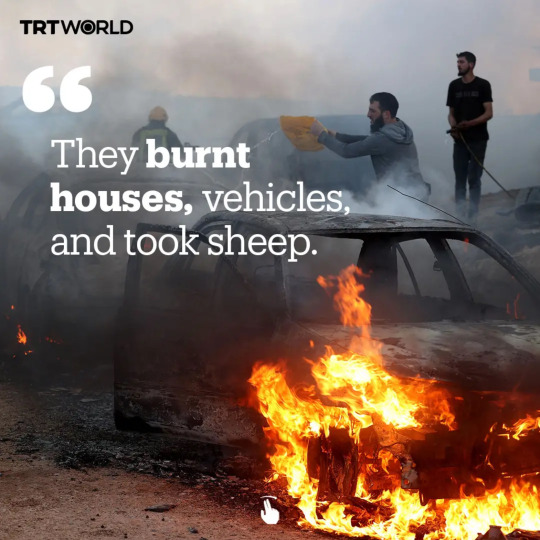
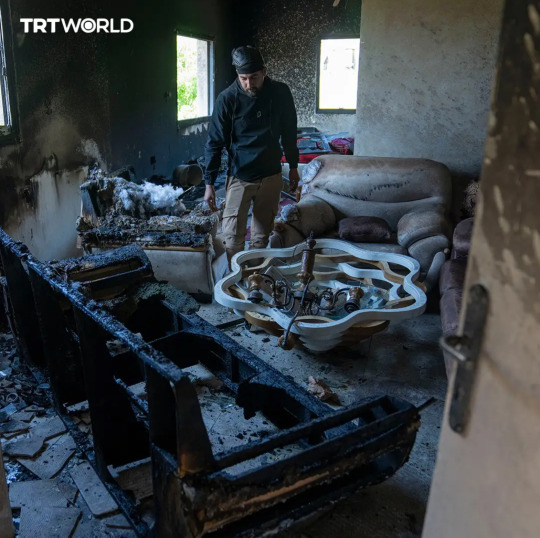
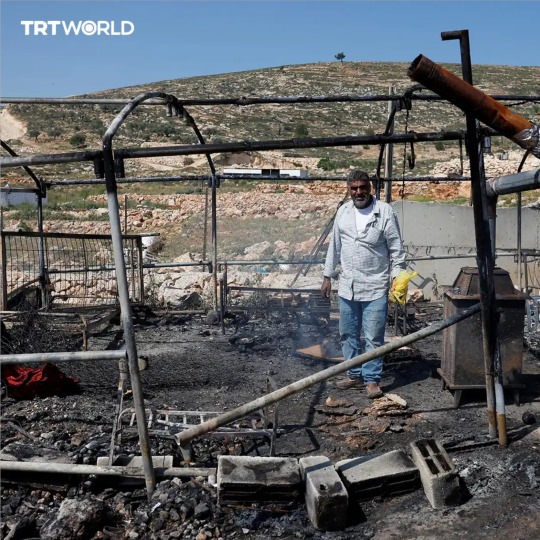
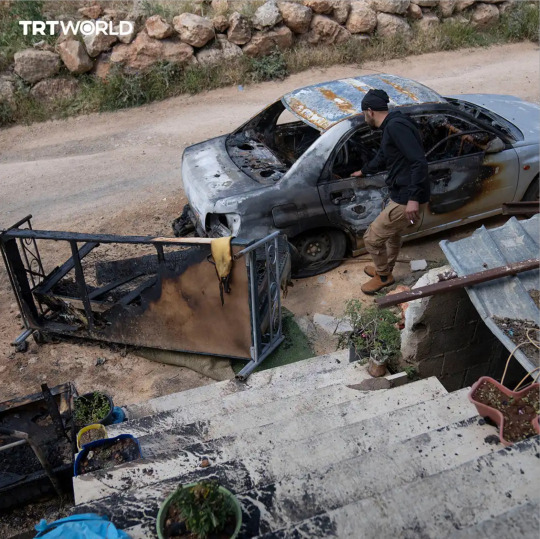
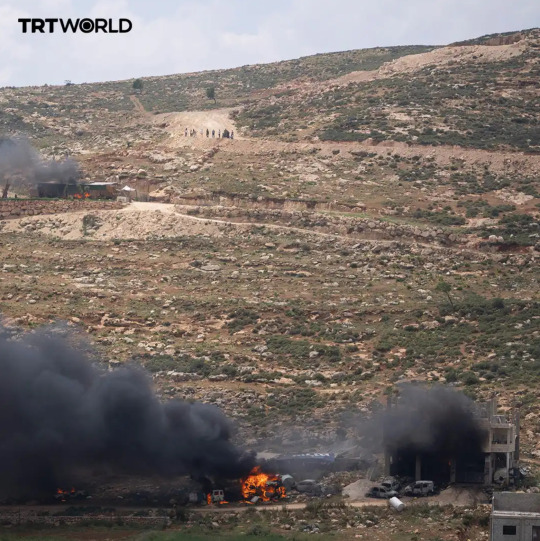
#TRT World 🌎#Destruction of Gaza | Forever Palestine 🇵🇸#Burning | Houses 🏠 | Vehicles 🚗 | Sheep 🐑#West Bank 🏦
2 notes
·
View notes
Text
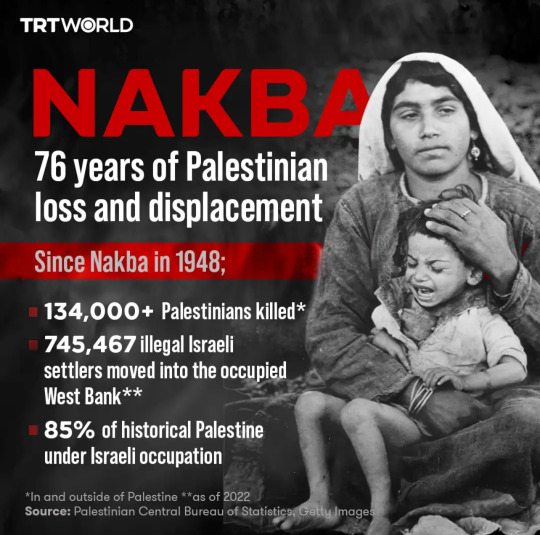
Nakba, the forced expulsion of a million Palestinians from their own land, marks the beginning of the tragedy for the Palestinians, who continue to suffer at the hands of the Israeli occupiers.
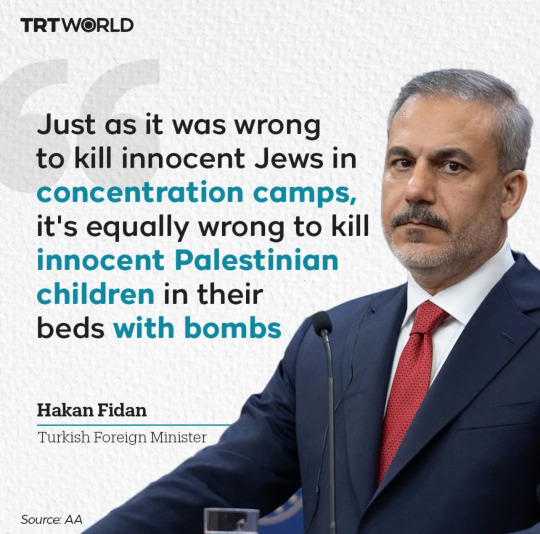
Türkiye 🇹🇷 has filed application of intervention for South Africa's Genocide Case against “The Terrorist , Fascist, Apartheid, War Criminal, Liar, Conspirator, Genocidal and the Illegal Regime of the Zionist 🐖 🐷 🐖 🐗 Isra-hell” at International Court Of Justice (ICJ) — Turkish Foreign Minister Hakan Fidan
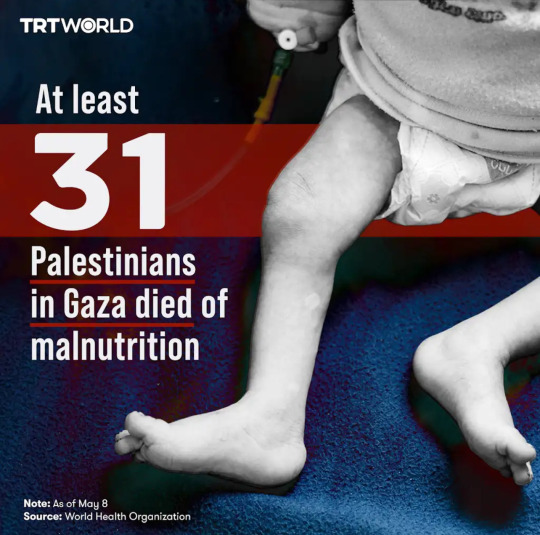
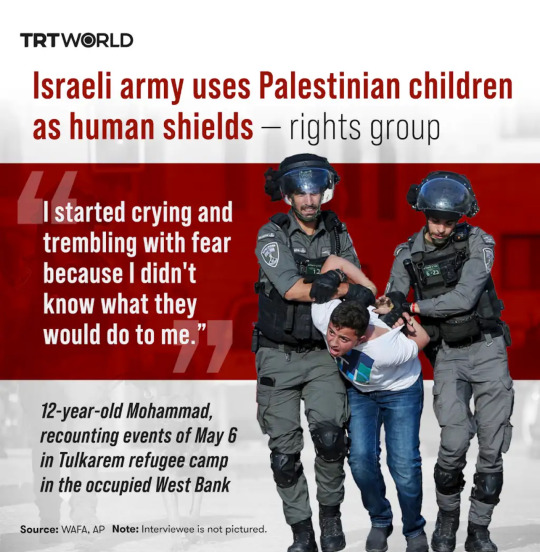
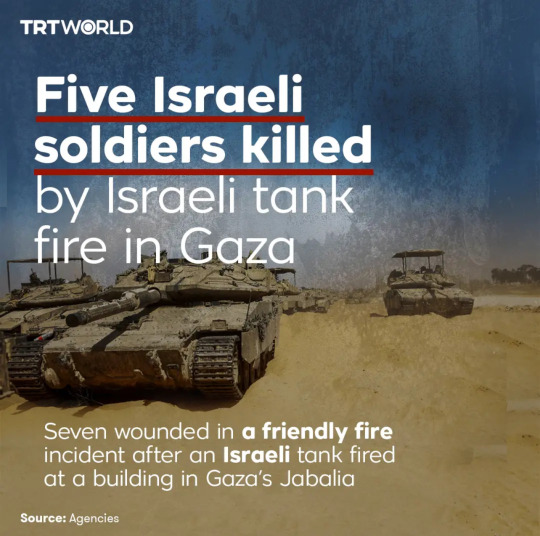
Five “The Terrorist , Fascist, Apartheid, War Criminal, Liar, Conspirator, Genocidal Zionist 🐖 🐷 🐖 🐗 of Isra-hell’s” soldiers were killed by “The Terrorist , Fascist, Apartheid, War Criminal, Liar, Conspirator, Genocidal Zionist 🐖 🐷 🐖 🐗 of Isra-helli Army Tank,” and went straight to hell to stay, rot and burn forever, in a friendly fire incident in Gaza's Jabalia on May 15. Tens of thousands of Palestinians have fled Jabalia after Israel relaunched an assault on the town last
#Miscellaneous News 🗞️#TRT World 🌎#Türkiye 🇹🇷#South Africa 🇿🇦#Genocide Case#International Court Of Justice (ICJ)#“The Terrorist Fascist Apartheid War Criminal Liar Conspirator Genocidal and the Illegal Regime of the Zionist 🐖 🐷 🐖 🐗 Isra-hell”#Palestinian Childern#Malnutrition#Palestinian Children | Human Shield 🛡️ | Isra-helli Terrorist Military
0 notes